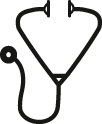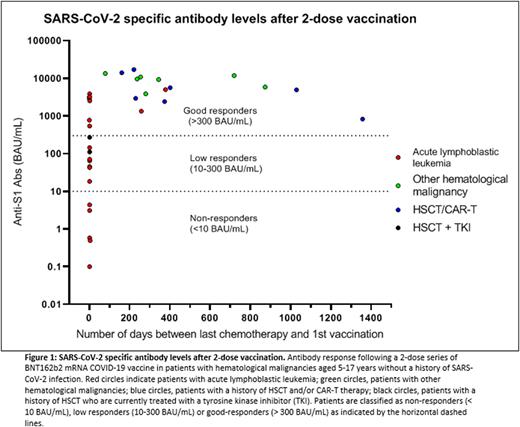Abstract

Pediatric patients with hematological malignancies have a higher risk of developing severe morbidity as well as mortality following SARS-CoV-2 infection than the general pediatric population. COVID-19 vaccinations are recommended for pediatric patients with hematological malignancies, but data on their ability to respond adequately to these vaccinations is largely lacking.
In this study we assess the immunogenicity of SARS-CoV-2 vaccination in children with hematological malignancies by investigating the humoral response following the primary 2 doses and the additional 3rd (booster) vaccination with BNT162b2 mRNA COVID-19 vaccination.
We conducted a prospective, observational cohort study at the Princess Máxima Center for Pediatric Oncology in Utrecht, the Netherlands. Patients with hematological malignancies aged 5-17 years were vaccinated with a 2- or 3-dose (12-16 years only) series of BNT162b2 (Pfizer/BioNTech) mRNA COVID-19 vaccine at our center or by the Municipal Health Services. Blood was sampled before the 1st vaccination and 4 weeks after the 1st, 2nd and 3rd vaccination. The primary study parameter was the serum concentration of anti-SARS-CoV-2 spike 1 (anti-S1) antibodies. In line with other COVID-19 vaccine studies, participants with anti-S1 levels < 10 BAU/mL were classified as non-responders, between 10-300 BAU/mL as low-responders and > 300 BAU/mL as good-responders. Children that underwent any chemotherapy or immunotherapy within the last 6 weeks before vaccination were considered to be under active treatment.
A total of 57 patients with hematological malignancies were enrolled of which 20 were excluded from primary analysis due to past SARS-CoV-2 infection based on serology (positive anti-SARS-CoV-2 nucleocapsid antibodies) and medical history. The remaining 37 patients (21 ALL, 5 Hodgkin lymphoma, 4 non-Hodgkin lymphoma, 7 other; median age, 14 years) had been fully vaccinated with 2 doses of BNT162b2 mRNA COVID-19 vaccine and 15 children aged 12 and above had received an additional third vaccination. Nine patients had a history of hematopoietic stem cell transplantation (HSCT) and/or CAR T-cell therapy, all longer than 5 months before vaccination. Twenty children (48.8%) were under active treatment.
Of the twenty participants vaccinated under active treatment, 7 (35%) were good-responders, 8 (40%) low-responders and 5 (25%) non-responders. The 16 patients who stopped active treatment more than 6 weeks prior to the first vaccination were all good-responders. After an additional 3rd vaccination in 8 patients under active treatment, median (range) anti-S1 antibody levels increased from 208 (0.1-3170) BAU/mL to 546 (62-5645) BAU/mL with 2 [25%] low-responders and 6 [75%] good-responders.
This study showed that over 60% of the pediatric patients with hematological malignancies under active treatment have insufficient anti-SARS-CoV-2 antibodies after a 2-dose series of BNT162b2 mRNA COVID-19 vaccination. A 3-dose vaccination series increases SARS-CoV-2 specific antibody titers compared to a 2-dose series and may be important for patients undergoing active treatment. Further research is needed to better identify risk factors for impaired humoral response after COVID-19 vaccination in pediatric patients with hematological malignancies.
Disclosures
No relevant conflicts of interest to declare.
Author notes
 This icon denotes a clinically relevant abstract
This icon denotes a clinically relevant abstract
Asterisk with author names denotes non-ASH members.


